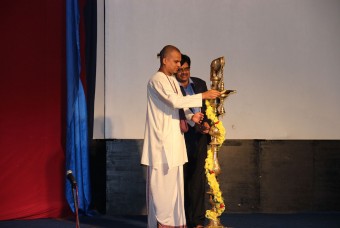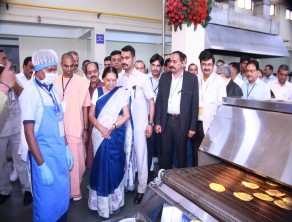Role of Akshaya Patra

The Akshaya Patra Foundation started its mid-day meal programme in June, 2000 by providing free mid-day meals to 1,500 children in 5 Government schools in Bengaluru, Karnataka. Over the past 15 years, the constant support from the Government of India, various State Governments and associated organisations has enabled the programme to grow by leaps and bounds. Today, this organisation feeds free mid-day meals to 1.4 million school children in 10,845 Government schools and Government-aided schools. The organisation currently has its presence in 24 locations across 10 states in India. This not-for-profit organisation has been conferred as the world’s largest NGO-run mid-day meal programme (source).
"We will spare no effort to free our fellow men, women and children from the abject and dehumanising conditions of extreme poverty..."
-Millennium Declaration, 2000
Hunger and Illiteracy are India’s two major challenges. There is serious malnutrition scenario in India with the World Bank’ estimate of 60 million children in India, being underweight. Hunger is an obstacle to child’s health, education and survival.
A recent UNICEF report states that more than 80 million children dropout before completing 8 years of age and over 8 million children are out of school.
Akshaya Patra is focused on eliminating classroom hunger and attracting more children (enrolment) to schools and ensure to keep them in school (reduce dropout rate) by feeding a filling, nutritious mid-day meal, every school day. This is in partnership with the Government of India and all the various State Governments.

The organisation, by means of this programme, aims at achieving the two most critical Millennium Development Goals: Elimination of hunger and Universalization of primary education.
The not-for-profit organisation works towards its vision of ‘No child in India shall be deprived of education because of hunger’. In order to achieve this vision, Akshaya Patra provides ‘unlimited food for education’. This wholesome meal is often the only source of nutrition for the whole day for many of the organisation's beneficiaries. Thus, to ensure that every child is benefited through this one meal, Akshaya Patra prepares nutritious meals that suit the local palate as well. For example: the kitchens in the northern parts of India serve rotis while the kitchens in the southern areas serve rice.
The Foundation runs its operations through two kitchen models- Centralised and De-centralised.
Centralised kitchens are large factory-like kitchen units that have the capacity to typically cook up to 100,000 meals a day. These kitchens serve a set of schools located around the units. These units are semi-automated thus ensuring hygiene during the cooking process. The technology and process used in centralised kitchens have been a topic of research and study in the course curriculum of many renowned universities such as Harvard (Study).
Locations where factors like unfavourable geographical terrain and improper road connectivity don’t support construction of large infrastructure, de-centralised kitchen are set up. De-centralised kitchen units are run by Women Self-Help Groups (SHGs) under the guidance and supervision of Akshaya Patra’s kitchen process and operations module.
What do the surveys say?
According to surveys conducted by various reputed organisations in the child health segment, 40 per cent of our country’s population is below 18 years of age. Out of this, less than 50 per cent goes to school. Economic and social circumstances force these children to forego education and engage in doing menial jobs in order to earn a single meal a day. Research also shows that universal education has lagged because of the prevailing hunger and malnutrition state. These two factors reduce school enrolments, hamper performance levels and increase school drop-out rates, especially among girls.
Hunger, especially classroom hunger impairs a child’s performance even if they do attend school. At this juncture, apart from the role of NGOs in child education, the Mid-Day Meal Scheme acts as a huge incentive in bringing these children to school. It prevents them from working and instead encourages them to study and get educated. In this way the programme also helps in the universalization of primary education.
When it comes to quality, there is no compromise
Hygiene and cleanliness is of utmost importance in each of the Akshaya Patra kitchens, be it centralised or de-centralised. Read about our kitchen for more information on quality control. The work of this not-for-profit entity has been recognized as a member of the National Steering-cum-Monitoring Committee (NSMC) for mid-day meal programme.
The success of this Public-Private Partnership is being appreciated widely and is also being considered as a model partnership worthy of adoption. The Foundation has also received global recognition by being ranked the 23rd NGO among the Top 100 NGOs of the world, by the Global Journal.
The Akshaya Patra Foundation © 2019 Website Designed & Maintenance By Creative Yogi




